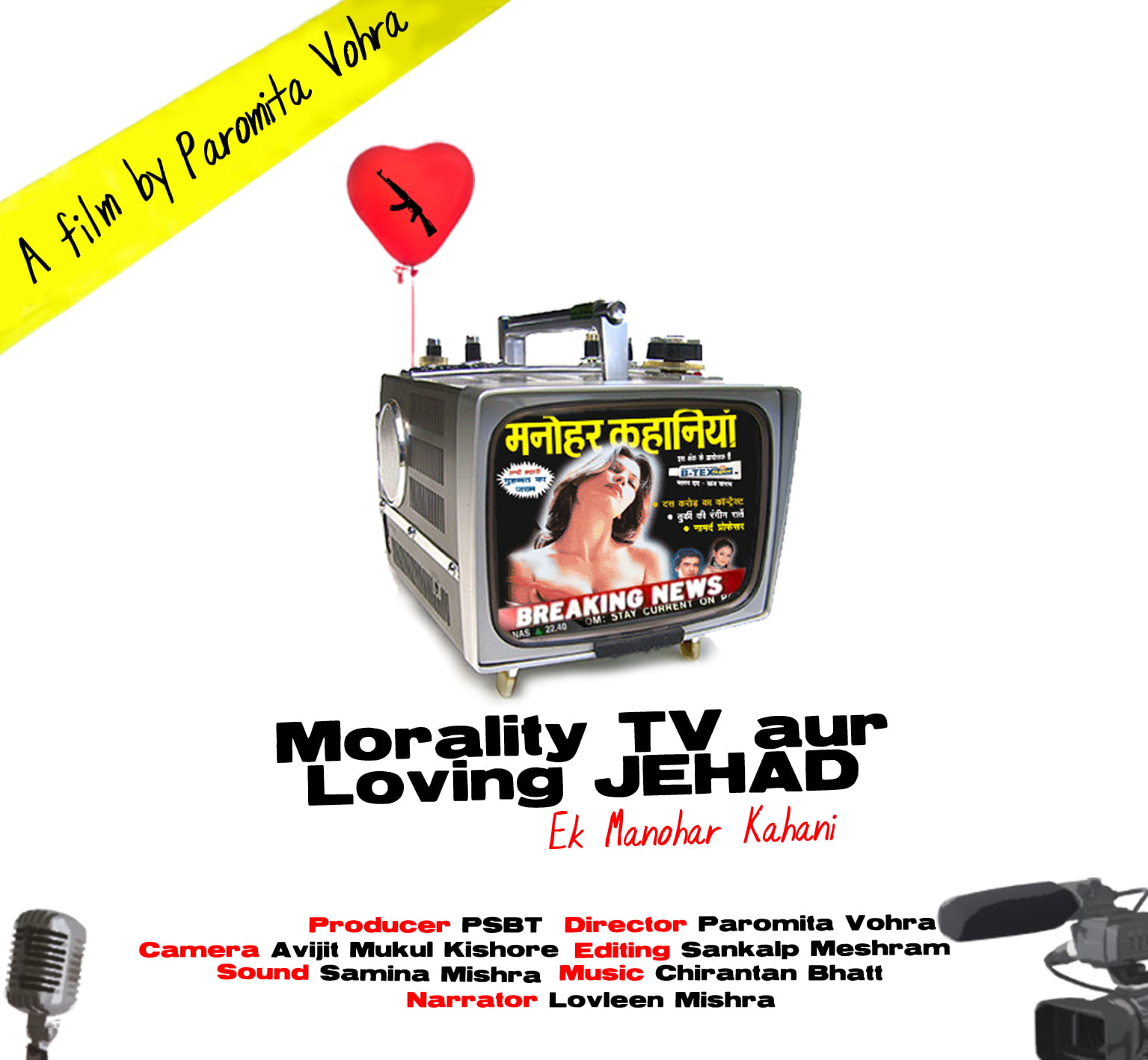Morality TV and Loving Jehad: Ek Manohar Kahaani is the story of Meenu. Now Meenu doesn’t feature in the film, nor is she an actual person. Meenu is just a medium for a message, an anecdote – so to say. She is young, innocent and in love, just like you or me.
As the documentary begins, Meenu’s romantic inklings are explicated in 3rd person by the narrator. She heads on a rendezvous with her “Romeo” and the passion between them is palpable. Meenu and “Romeo” are frustratingly indifferent to the fact that they live in a country where love is a “double-edged dagger” and once you’re cut, “the blood runs hot and it is bound to spill“.
Paromita Vohra’s 2007 documentary begins with visuals that set the right tone for the 30-minute-long revelatory journey into the “love landscape” of India. The camera slowly pans across stacks and stacks of erotic pulp fiction to women fighting legal cases for their right to space. Morality TV and Loving Jehad tells it all. It is brutal, honest and alarming. To state it simply, the film is a mirror reflecting the politics and culture of interference that is curated around the notion of romantic love.
The documentary touches on multiple themes throughout and uses the crutch of examples in the Indian context to drive its point home. Whilst speaking of moral policing and its intensity in the country, the conversation bends towards Operation Majnu. When showing couples being shamed by the police for being seen in public, Vohra not only introduces a rhetoric of moral policing but also the masked agenda of political parties trying to gain publicity through such acts and news houses hovering around looking for bytes of “spicy news”.
Vohra also fluidly edges the filmography to talk about women’s mobility and sexuality while speaking of moral policing.
The Indian media is an important subject which the filmmaker sensitively manoeuvres through. She brings in the idea of performance and audience; creator and observer. She strategically tries to showcase that the media is using sensitive incidents to gather more eyes towards it, monetize these issues and partakes in its own contorted form of moral policing by creating “morality TV”. The media’s catalytic role in causing chaos during incidents like Operation Majnu is not lost on the audience.
Vohra also fluidly edges the filmography to talk about women’s mobility and sexuality while speaking of moral policing. When Rakhi Sawant is shamed on national TV for “inviting” Mika Singh to kiss her or when dance bars are shut on the basis of “women indulging in unsanskaari behaviour” – there are telling thoughts raised. Even though it may not be explicitly put in the narrative, the film is successful in raising the question – do women have the agency to take charge of their own sexuality?
From the 16th minute onwards, the film addresses the latter part of its title – “Loving Jehad“. For a documentary that is primarily rooted in love, consent and agency, it is still not averse to the communal back-end of these issues. When a Vishwa Hindu Parishad member in his interview associates inter-religious love to systematized terrorism, it makes the flowery fantasy of romance in this country anything but apolitical. Morality TV and Loving Jehad explicates this fact.
Also Read: Film Review: The World Before Her
“Love operates according to a different system in our Hindu culture. We only have love between a brother and sister, mother- father, mother-son and children and their books.”
–Sandeep Pahal, Vishwa Hindu Parishad
There are uncomfortable by-products to love that are almost never talked about in popular, Indian media. Refreshingly, these themes are exactly what Paromita Vohra chooses to address, critique and get a conversation going about.
Morality TV and Loving Jehad isn’t a linear, unidimensional revelation. It has multiple viewpoints, inputs and angles. There are larger umbrella issues and there are subsets within them which are addressed in a concentric manner as the film moves ahead. The range of interviewees is also kept diverse and includes politicians, news channel employees, women and lawyers.
Paromita Vohra’s cinematographic style includes raw, uncut footage along with participation from the filmmaker herself during some sections. Her framing is also often done from a “voyeuristic” angle to possibly drive the point of policing forward.
For a documentary that is rooted in love, consent and agency, it is not averse to the communal back-end of these issues.
Additionally, she has introduced secondary source footage sources to make media references and cite infamous incidents. She uses VFX to create a multiple screen effect in some sections which gives her documentary a panopticon-esque view. The sound score of the film uses mostly talk from the primetime news, raw, on-location-recorded songs, or just noise even.
Morality TV and Loving Jehad in this context is thrilling. Which comes from boosts of moral superiority, political powerplay and violence that is insinuated by multiple groups. However, when the film ends with two boys in an Archies store scrounging for Happy New Year cards for their girlfriends, there is a sudden transition in tone.
In Vohra’s words – “the gaze of judgement turns into the gaze of love”. We realize that an innocent act of love has been mutilated and demonized beyond recognition and at its core Morality TV and Loving Jehad seems to call this out.
Also Read: 8 Stories Of #UnsanskariLove To Give You The Warm Fuzzies
Featured Image Credit: Film South Asia
About the author(s)
Shruti spends the better half of her day learning about feminism or tweeting about it. She intends to travel more and eat foods she can't spell.



